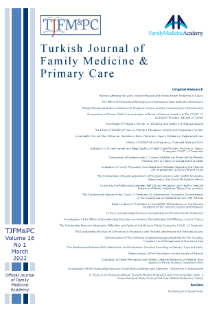Should Iodine be Supported in Pregnancy? A Hospital Based Study
Pregnancy, iodine deficiency,
___
- 1. Andersson M, Karumbunathan V, Zimmermann MB. Global iodine status in 2011 and trends over the past decade. Journal of Nutrition 2012;142: 744–750
- 2. Zimmermann MB. Iodine deficiency in pregnancy and the effects of maternal iodine supplementation on the offspring: A Review. Am J Clin Nutr 2009; 89(2):668-672.
- 3. Zimmermann MB, Delange F. Iodine supplementation of pregnant women in Europe: A review and recommendations. Eur J Clin Nutr 2004; 58(7): 979-984.
- 4. Yarrington C, Pearce EN. Iodine and Pregnancy. Journal of Thyroid Research. 2011;2011:934104.
- 5. Vitti P, Rago T, Aghini-Lombardi F, Pinchera A. Iodine deficiency disorders in Europe. Public Health Nutr.2001;4(2B):529-535.
- 6. Russel R, Beard J, Cousins R, Dunn J, Ferland G, Hambidge KM et al. Panel on micronutrients. Dietary reference intakes for vitamin A, vitamin K, arsenic, boron, chromium, copper, iodine, iron, manganese, molybdenum, nickel, silicon, vanadium, and zinc, National Academy Press, Washington, DC, USA. 2001:275-278
- 7. Braverman LE. Adequate iodine intake—the good far outweighs the bad. European Journal of Endocrinology 1998;139(1):14-15.
- 8. Egri M, Ercan C, Karaoglu L. Iodine deficiency in pregnant women in eastern Turkey (Malatya Province): 7 years after the introduction of mandatory table salt iodization. Public Health Nutr 2009;12(6) 849-52.
- 9. Erdoğan MF, Ağbaht K, Altunsu T, Ozbas S, Yucesan F, Tezel B. et al. Current iodine status in Turkey. J Endocrinol Invest 2009;32(7):617-622.
- 10. Kut A, Gursoy A, Senbayram S, Nilüfer B, Isıl IB, Akgün S. Iodine intake is still inadequate among pregnant women eight years after mandatory iodination of salt in Turkey. J Endocrinol Invest 2010;33(7):461-464.
- 11. Qian M, Wang D, Watkins WE, Gebski V, Yan YQ, et al. The effects of iodine on intelligence in children: a meta-analysis of studies conducted in China. Asia Pac J Clin Nutr. 2005;14(1):32.
- 12. Erdoğan MF. The iodine status of Turkey: Where were we? Where are we now? Review. Türkiye Klinikleri J Endocrin Special Topics 2008; 1 (3):8-13.
- 13. Pearce EN, Andersson M, Zimmermann MB. Global iodine nutrition: Where do we stand in 2013? Thyroid. 2013;23(5):523-528.
- 14. Oguz Kutlu A, Kara C. Iodine deficiency in pregnant women in the apparently, iodine-sufficient capital city of Turkey. Clin Endocrinol (Oxf) 2012;77(4):615-620.
- 15. Katarzyna W, Krystyna SB. Effect of storage conditions on potassium iodide stability in iodized table salt and collagen preparations. International Journal of Food Science & Technology 2007;43(5):895 -899.
- ISSN: 1307-2048
- Yayın Aralığı: Yılda 4 Sayı
- Başlangıç: 2007
- Yayıncı: -
Sigaranın Çocuğa Etkileri Konusunda Ailelerin Farkındalıkları, Tutum ve Davranışları
Seda TOPÇU, Elanur AKIN, Betül ULUKOL, Filiz ŞİMŞEK ORHON, Sevgi BAŞKAN
Sosyal Hizmet Uzmanlarının Mesleki Bağlılık Düzeylerinin Bazı Değişkenlere Göre İncelenmesi
Semra SARUÇ, Hüsnünur ASLANTÜRK
Hülya PARILDAR, Guldeniz AKSAN DESTELİ, Tevfik Berk BİLDACI, Özlem CİĞERLİ
Gebelikte İyot Desteği Gerekli Midir? Hastane Temelli Bir Çalışma
Tevfik Berk Bildacı, Hulya Parildar, Ozlem Cigerli, Güldeniz Aksan Desteli
Kırsal Alanda Yaşayan Yaşlılar için Sağlık Hizmeti Sunum Modelleri ve Tele-Sağlık
Yasemin DEMİR AVCI, Sebahat GÖZÜM
Jasmine Shanthi KAMATH, Raghavendra KINI, Sangeetha R., Sivakumar MURUKAN, Vathsala NAIK, Ananya MADİYAL
Bupropion Hcl Tedavisinde Gelişen Alerjik Reaksiyon: Olgu Sunumu
BURCU KAYHAN TETİK, Işılay GEDİK TEKİNEMRE, Hacer Gözde GÜL, Burak METE, Samima HASSANLI, Wadee ALHURAIBI
